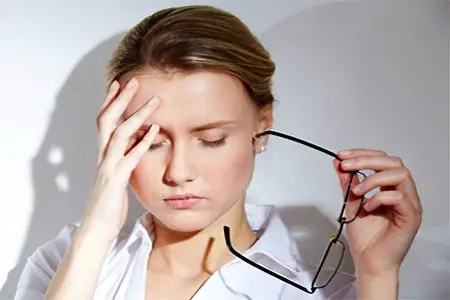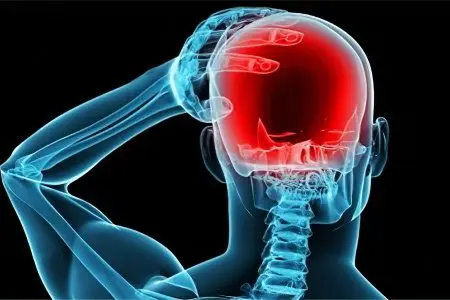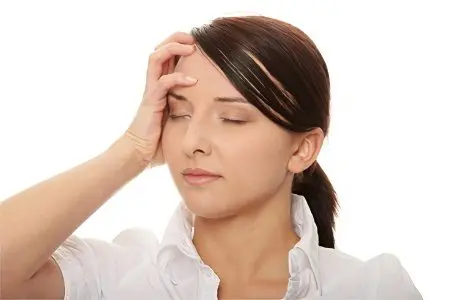Contents

Most people associate dizziness with changes in blood pressure levels. Some patients believe that their head is spinning with its increase, and the other part of the people that with a decrease in its marks. However, sometimes attacks of dizziness occur against the background of normal blood pressure. The causes of discomfort can be hidden in violations of the functioning of the vestibular apparatus, the brain, and even in banal overwork. To clarify the nature of dizziness, you need to contact a specialist and undergo a comprehensive examination.
Causes of dizziness at normal pressure

If the tonometer readings remain within the normal range, and the person experiences dizziness, then this may be related to such reasons as:
Diseases of the cervical spine. Hernias, displacement of the vertebrae and osteochondrosis can provoke an attack of dizziness. In this case, the blood vessels that feed the brain are infringed, it does not receive enough blood, which affects the patient’s well-being. Diseases of the spine are always accompanied by characteristic pains, since, in addition to blood vessels, nerve fibers suffer.
Inflammatory processes localized in the structures of the ear. This includes otitis media and damage to the eardrum. Inflammatory diseases of the inner ear are the cause of dizziness, since it is in this place that the human vestibular apparatus is located. Therefore, the more intense the symptoms of the disease, the more dizzy will be.
Tumor neoplasms of the brain.
Diseases of the central nervous system. Dizziness develops against the background of vegetative-vascular dystonia, which leads to impaired blood flow throughout the body.
Compliance with strict diets, nutritional errors, prolonged hunger strikes. This is especially true for people who refuse to eat animal products. Developing iron deficiency anemia and a lack of B vitamins will lead to dizziness.
In medicine, there is such a term as BPPV – benign positional paroxysmal vertigo. It develops due to the movement of calcium crystals in the inner ear with a rapid change in the position of the head. Normally, otoliths should not be present there.
Meniere’s disease is another pathology of the inner ear, in which a person is disturbed by ringing in the ears, sudden bouts of dizziness and incoordination. Attacks can last several hours, which worsens the quality of life of a person.
Received traumatic brain injury.
Atherosclerosis of the vertebral arteries can lead to bouts of dizziness. With this pathology, the lumen of the vessels is clogged with a cholesterol plaque, so the brain receives less oxygen.
Vertigo attacks can develop in people suffering from migraines. As a rule, the head is not only spinning, but it also hurts. A person during an exacerbation of the disease does not tolerate noise well, tries to stay away from bright light.
Severe mental disorders, which come down to phobias and panic attacks, can lead to severe dizziness against the background of normal blood pressure.
Poisoning with toxic substances, the use of significant doses of alcoholic products.
The head will spin with a stroke. In this case, the person’s condition deteriorates sharply, his speech begins to suffer, movement coordination is disturbed.
Menopause, menstrual bleeding.
Patients with diabetes often suffer from bouts of dizziness. A similar situation occurs with a sharp drop in blood glucose levels, for example, when taking high doses of sugar-burning drugs or insulin.
High body temperature in various viral and bacterial infections is accompanied by dizziness and general weakness.
Dizziness not associated with disease

Sometimes the head may be spinning due to external and internal causes that are not associated with any disease. In this case, the person does not need treatment, since such dizziness is a temporary phenomenon. After the elimination of the external factor, the state of health returns to normal.
Such situations include:
Motion sickness in a car, on a train, on a boat. People feel dizzy when traveling by different modes of transport if they have a poorly developed vestibular apparatus. Most often, this problem occurs in childhood.
Carousel rides make you dizzy
Nervous tension can provoke an attack of dizziness in an absolutely healthy person. This is due to the fact that at such moments a large amount of adrenaline is released into the blood, and the heart begins to beat faster. At the same time, the pressure level remains within the normal range. It is enough to calm down so that the attack of dizziness subsides.
A person’s head can spin while climbing to a height.
Taking certain medications can cause dizziness. Often such a side effect develops during treatment with antibiotics, oral contraceptives, tranquilizers, etc.
The head is often spinning in women in position.
The head may begin to spin with a sudden change in body position, for example, when moving from a horizontal to a vertical position. When getting up from the bed, oxygen entering the brain along with the blood does not have time to saturate it, which leads to dizziness and darkening in the eyes.
Sometimes the head is spinning in people during the period of adaptation to new lenses or glasses that are prescribed to him for vision correction.
Another obvious cause of dizziness against the background of normal blood pressure is physical overwork. To get rid of an unpleasant symptom, it is enough just to get a good night’s sleep.
Video: Medical TeleAcademy “about the types of dizziness, its causes and methods of treatment”:
Tips for people with chronic dizziness

Sometimes dizziness becomes habitual for a person and haunts him on an ongoing basis, for example, with Meniere’s disease, which is incurable.
To make your life easier and minimize the risk of injury, you should take into account the following recommendations:
Sharp movements should be avoided.
If necessary, use a cane while walking.
In the house, wires should not lie on the floor, carpets and other objects that can cause falls should be removed.
During the next attack of dizziness, you need to sit down or lie down.
People with chronic dizziness should not drive.
It is important to stop drinking coffee and alcohol. Inhaled tobacco smoke can exacerbate an attack of dizziness.
Be sure to observe the regime of work and rest, eat right, spend more time in the fresh air.
When dizziness is associated with taking medications, you need to consult a doctor and replace them with other drugs.









